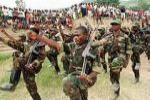A New Flare-Up of the War in Congo

The beginning of autumn was marked by a new flare-up of military operations in the central part of Africa. In early September troops from the rebel group M23 attacked the encampment of the UN mission to DR Congo in Kibati. The government of the Democratic Republic of the Congo (DRC) sent a letter to the UN Security Council to request immediate intervention. The government of DR Congo demanded that the UN Security Council force Rwanda to finally withdraw its troops from the eastern part of the DRC and ask the International Criminal Court to declare the actions of M23 crimes against humanity… (1)
As a result of the military conflict in the DRC, there are now 2.6 million displaced persons (in 2012 there were 1.8 million) (2), over half a million refugees and 6.4 million in need of food assistance and emergency agricultural aid. (3) As for the victims over the entire period of the conflict, according to various estimates they number from 3.5 to 5 million dead.
The situation in DR Congo is one of the most complex in Africa; dozens of militant groups supported by several states at once are involved in the armed conflict. Among the main militant groups are M23, the Democratic Forces for the Liberation of Rwanda (FDLR), the Allied Democratic Forces and the National Army for the Liberation of Uganda (ADF-NALU), and Mai Mai Kata Katanga.
DR Congo’s main problem is the March 23 Movement (M23). With foreign support, it started plundering the natural resources of the DRC on a grand scale. At the same time, 2013 brought substantial changes to M23’s situation. In March the group’s leader, General Bosco Ntaganda, was overthrown and immediately transferred to the International Criminal Court in The Hague. (4) Up until then Ntaganda and his M23 had enjoyed the support of Rwanda. However, as it turned out, the overthrow of Ntaganda was also organized by the Rwandan government, which had previously supplied Ntaganda with ammunition, but then supported the rebel general Makenga with weapons and soldiers. As a result Rwanda maintained its control of M23, and the majority of the missile strikes in the new flare-up of the war were made from Rwandan territory. This was accompanied by a provocation: M23 fighters, who had control of the territory of eastern DR Congo, shelled the territory of Rwanda, thus ensuring a missile «counterstrike» from the Rwandan army against DR Congo’s territory. A similar provocation was organized before Rwanda’s invasion of Goma in November 2012.
Kibati, where the attack took place, is the location not only of the UN mission to DR Congo, but of a unique UN division, the special Force Intervention Brigade (FIB). No other UN mission has such a division with such powers. The brigade was created March 28, 2013 by UN Security Council resolution No. 2098 (2013) as part of the United Nations Organization Stabilization Mission in the Democratic Republic of the Congo (MONUSCO). The resolution extended the mandate of MONUSCO until March 31, 2014. The brigade is to include three infantry battalions, one artillery battery and one Special Forces Company. The declared objective of the FIB is «contributing to reducing the threat posed by armed groups to state authority and civilian security in eastern DRC and to make space for stabilization activities». The task of the FIB is defined as «neutralizing» armed groups. The term «neutralizing», unusual for a UN Security Council resolution, means «carry[ing] out targeted offensive (emphasis ours. – A.M.) operations». Such operations are to be conducted independently or jointly with the armed forces of the DRC. (5)
Russia supported the deployment of the FIB, (6) stating that it ought to help «achieve a qualitative breakthrough in combating anti-governmental groups». On the whole, Russia’s position on the Congolese crisis consists in demanding the immediate and total cessation of violence in the region. Russia decisively condemned the unlawful armed groups which have renewed military operations in eastern DRC, as well as foreign support of them. The Russian representative emphasized that the fundamental responsibility for establishing peace in the DRC belongs to the countries of the region themselves, with the assistance of the African Union and subregional organizations.
The war in the DRC has been raging for several decades, and the question arises: who is encouraging it? A recently published report from a group of UN experts on the DRC asserts that the activities of M23 are financed «through a network of individual supporters and business dealings». (7) It is claimed that the main source of income for the movement is taxation of commercial trucks crossing at checkpoints in areas controlled by M23. (8) However, it is doubtful that «taxation of trucks» could provide financing for years of military operations by tens of thousands of well-armed fighters. In fact, the Congolese war is financed through the plundering of the country’s natural resources, first and foremost gold. The plundering is carried out in the eastern part of the DRC via Uganda and Burundi. Tin, tantalum, wolfram and other metals are also objects of plunder.
At one of the meetings of the UN Security Council at which the situation in the DRC was being considered, the president of the World Bank announced the allocation of 1 billion dollars for a program for the development of the DRC. (9) However, the profits from plundering the DRC are much greater than this amount, and if the plunder is not stopped, no «humanitarian» programs will help. The war in the Democratic Republic of the Congo is a war for resources. The new flare-up of military operations is linked with the attempt of numerous armed groups to secure the most advantageous positions in connection with the start of the formation of the UN Force Intervention Brigade with its new military powers, not only for defensive operations, but for offensive ones as well.
Notes

